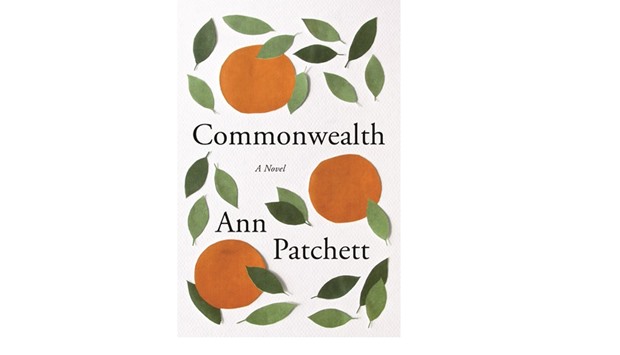FICTION
Commonwealth, by Ann Patchett (Harper). Reading Patchett’s new novel, her seventh, is like taking a master class in the art of smart, accessible literary fiction — and she makes it look easy. Inspired by her own family story, Commonwealth is about the aftershocks of divorce, and the uneasy union of two families though remarriage. Opening with the christening party where Beverly Keating first meets Bert Cousins, the narrative circles around various family members over the decades. “Patchett’s slyly knowing voice — full of wit and warmth — elevates every page of this novel,” said reviewer Tom Beer.
Read the review: nwsdy.li/2cf9N25
Swing Time, by Zadie Smith (Penguin Press). The sixth novel by the English author of White Teeth and On Beauty begins with the unnamed narrator and her friend Tracey — biracial girls who meet at a dance class in working-class North London. Smith follows their rocky relationship into adulthood, engaging themes of race, class, privilege, celebrity and cultural appropriation in coolly elegant prose, always sparkling with style, wit and insight. Reviewer Marion Winik called Smith a “cunning, trap-setting, theme-braiding storyteller.”
Read the review: nwsdy.li/2eFUvSA
The Underground Railroad, by Colson Whitehead (Doubleday). This was Colson Whitehead’s year: His sixth novel was selected for Oprah’s Book Club and won a National Book Award. The Underground Railroad is the story of Cora, an escaped slave who makes her way through the American south on a train that literally runs through underground tunnels, reimagining America’s dark racial history in a series of Gulliver’s Travels-style episodes. “Whitehead’s novel poses beautifully shaped questions that speak not just to history, or to the present day, but to eternity itself,” wrote reviewer Gene Seymour.
Read the review: nwsdy.li/2aUfJfO
Imagine Me Gone, by Adam Haslett (Little, Brown and Company). Mental illness runs like a throughline in the fiction of Adam Haslett (You Are Not a Stranger Here, Union Atlantic). In his new novel, it finds its most powerful iteration. Told in alternating sections by five members of a family devastated by a father’s manic depression and challenged by the chronic anxiety of a son, Imagine Me Gone lavishes as much attention on the wife and the siblings living in the shadows of these tragedies. “We come to know the family at the centre of Adam Haslett’s powerful new novel … as intimately as if it were our own,” wrote reviewer Tom Beer.
Read the review: nwsdy.li/2gdjei2
The Nix, by Nathan Hill (Alfred A. Knopf). This kaleidoscopic debut novel — titled after a shapeshifting demon of Scandinavian folklore — is mind-blowingly good. A depressed, video-game-addicted assistant professor of English re-encounters his mother decades after she disappeared from his life, when she makes news throwing a handful of gravel at a Republican presidential candidate. The Nix hopscotches through the years to fill in the blanks of their history, with a bravura set piece during the violent protests in Chicago, 1968. Reviewer Dan Cryer called it “a great sprawling feast of a first novel.”
Read the review: nwsdy.li/2gHGIku
NONFICTION
Strangers In Their Own Land: Anger and Mourning on the American Right, by Arlie Russell Hochschild (The New Press). For all the ink spilled over the presidential election this year, very little shed light on the galvanic political changes in the country. This book by a Berkeley, California, sociologist was researched and written long before Donald Trump’s November upset. But in listening to alienated working men and women of the Louisiana bayou — Tea Party sympathisers and future Trump voters — Hochschild captures the emotional terrain of US politics. “It is billed as a book for this moment, but it will endure,” wrote reviewer Gabriel Thompson.
Read the review: nwsdy.li/2cCGLsD
American Ulysses: A Life of Ulysses S. Grant, by Ronald C. White (Random House). A biographer of Abraham Lincoln turns his attention to the misunderstood Civil War general and US president in this sympathetic, rigorously sourced book. White follows Grant from his hardscrabble Ohio childhood through the crucible of the Civil War, where the chronicle truly soars. American Ulysses also offers a fair-minded assessment of Grant’s scandal-plagued presidency. “What emerges from these pages is Grant’s essential decency,” wrote reviewer Matthew Price.
Read the review: nwsdy.li/2dEIYDA
Mad Enchantment: Claude Monet and the Painting of the Water Lilies, by Ross King (Bloomsbury). For more than 30 years, the great French Impressionist painter was obsessed with capturing the water lilies in the garden of his home at Giverny — creating some of the most famous artworks in the world. The author of several marvellously readable narrative art histories, Ross King brings both Monet and his sublime paintings to life. Reviewer Linda Simon called the book “sensitive, deeply researched and altogether delightful.”
Read the review: nwsdy.li/2cgBzck
Born A Crime: Stories from a South African Childhood, by Trevor Noah (Spiegel & Grau). Not your average celebrity memoir, this book by the South African-born comedian and host of The Daily Show on Comedy Central is a comic romp — at the same time that it illuminates the impossible situation of a mixed-race child during and after apartheid. The heroine of Noah’s story turns out to be his mother, Patricia — a super-devout Christian Xhosa woman determined to raise her son for great things. “Noah has a real tale to tell, and he tells it well,” said reviewer Tom Beer.
Read the review: nwsdy.li/2gzgMXq
The Bitter Taste Of Victory: Life, Love, and Art in the Ruins of the Reich, by Lara Feigel (Bloomsbury). As Allied forces flooded into the ruins of Germany at the end of World War II, a legion of writers, journalists, poets and filmmakers followed in their wake. The Bitter Taste of Victory shows us these figures — including Marlene Dietrich, Billy Wilder, W.H. Auden, Martha Gelhorn and Rebecca West — as they grappled with the meaning of the apocalypse that Europe had endured. “Feigel mixes big-picture storytelling with piquant biographical studies,” wrote reviewer Matthew Price.
Read the review: nwsdy.li/2gjeQPZ —Newsday/TNS

